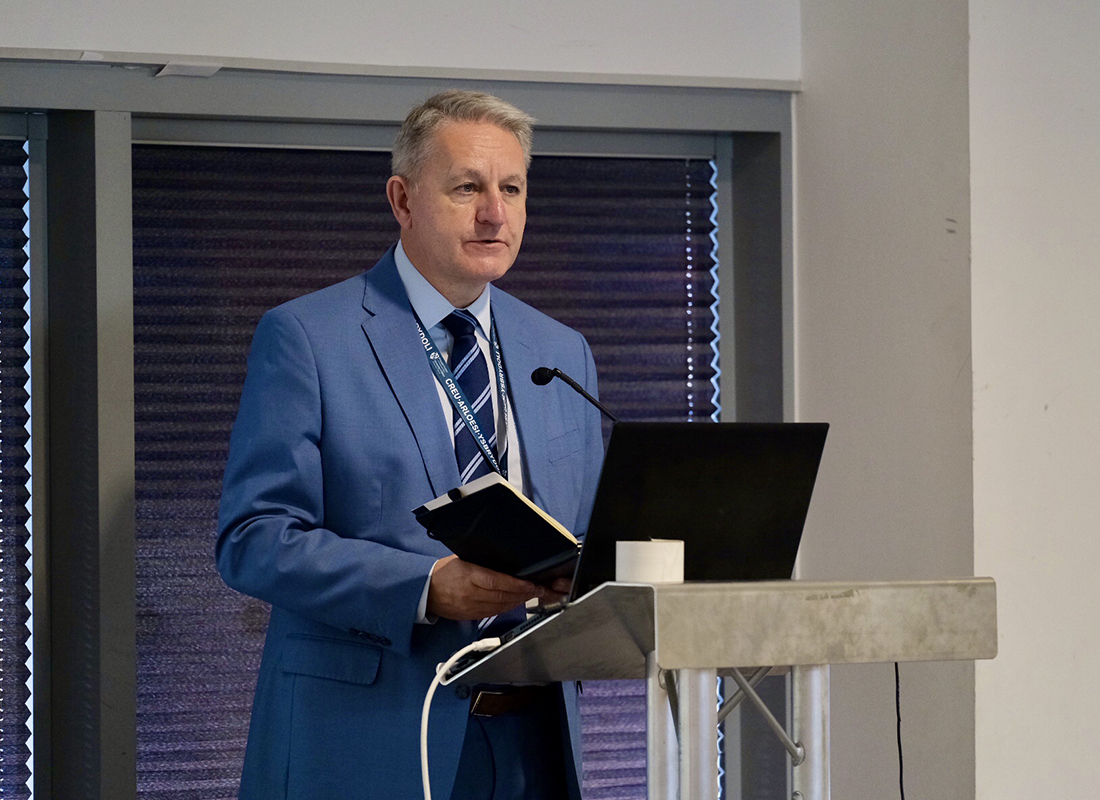The BCS Health and Care Executive Chair, Dr Philip Scott, says there is a fundamental need for accreditation for those working in health and care informatics. He made the point in his keynote speech in Cardiff at the European Federation of Medical Informatics Conference, hosted by the University of Wales Trinity Saint David (UWTSD) and the Wales Institute of Digital Information (WIDI), with support from BCS.
The theme of the conference was the need for professional education, training, and continuing professional development of the health and care informatics workforce.
At the conference, Claire Penketh caught up with Dr Philip Scott, and Professor Wendy Dearing, Dean of the Institute of Management and Health at UWTSD, Professionalism Lead on the UK-wide BCS Health & Care Executive, and board member of the Federation for Informatics Professionals (FEDIP). FEDIP is a public register of informatic professionals who work in health and social care.
What are the main benefits of this type of conference?
Dr Philip Scott: It's the opportunity for us to share knowledge, and experience across Europe. We know what works and what doesn't in digital health and care in Wales, across the UK and we can share that, and also learn from our European colleagues. There are other areas where they're more advanced in various educational methods or topics. The conference helps bring us all up to a level because unless we have that shared experience and shared knowledge, we may not get the benefits that we want for our health services and for our patients.
Professor Wendy Dearing: It's extremely important for Wales. Wales as a devolved nation, looks at health and care in the round and it's about compare and contrast for us, because often in Wales we think, "Oh, are we doing as much as small country?" This is a really good opportunity for us to sit and reflect and say, "Yeah we're doing some great stuff in Wales," but we can learn as well from the rest of the world, including Europe in terms of what is good, what does good look like and then what is excellent what does excellent look like? Because we need to transform the health and care sector and digital is the way to go.
How important was it to have Julie Morgan MS, the Deputy Minister for Social Services giving the opening address to the conference?
Professor Wendy Dearing: I think it gives the right message that this is a really important topic that one of the ministers from Welsh government can take time out of their busy schedules to come and actually lay the foundations to show their commitment to the rest of Europe, to really show that the Welsh government is supportive of this agenda, and us too, as we compare and contrast across Europe, and see that we're doing some good stuff.
There was a lively discussion about the setting of the criteria for the accreditation of health informaticians. So, in this fast-moving world of digital health how easy is it to define what health informaticians do and to set the standards for your work?
Professor Wendy Dearing: It's extremely difficult because what was required two, three years ago in terms of the workforce may not be required today. There will be future needs tomorrow that aren't even emerging as yet, but for me there's also something there about the basics.
For you
Be part of something bigger, join BCS, The Chartered Institute for IT.
We will all need the skills whether we're the clinicians, using the service or working in other parts of the health and care system. We all need those digital skills, but we do need to take the time out to start to future proof, by looking at the needs of the service, and who needs to develop those requirements of the jobs and the roles.
Then we in academia can look to see which qualifications are most appropriate. And sometimes that's about turning what we've done that in the past on its head by saying, "This isn't a program we've got, or this is a new role, and these are the competencies and skills that people need for this role, these are the tasks that will be needed for this role." Then we in academia can do the wraparound, as I call it, and put the qualification structure around that.
Dr Philip Scott, you told the conference about the benefits of FEDIP, a public register of qualified and competent informaticians. Why is it important?
Dr Philip Scott: Well, in the same way as when you're having an operation, you want to know you've got a suitably qualified staff, from the surgeon, the anaesthetist and the rest of the team.
This applies equally to the use of data, the use of information and the design and use of technology. These are things which impact how the services are delivered and ultimately can affect patients’ lives, so we need to have the properly qualified informatic professionals.
Part of that is the FEDIP public register which says: “Yes, this is someone who knows what they're talking about, this is someone who can advise us, this is someone who can devise a strategy, this is someone who can implement a project." And so, we need that recognition of how vital this role is and the register is part of that.
What do you think about the impact of the pandemic, which saw a surge of digital transformation in the health sector?
Professor Wendy Dearing: I think the impact of COVID showed us the importance of digital transformation. It's also shown us that we've missed some of the human connections. We know we can transform services using digital and exploiting digital, but we also know we need those human connections, and, coming back to today, the importance of the richness of learning is immense because we're in a face-to-face situation.

















